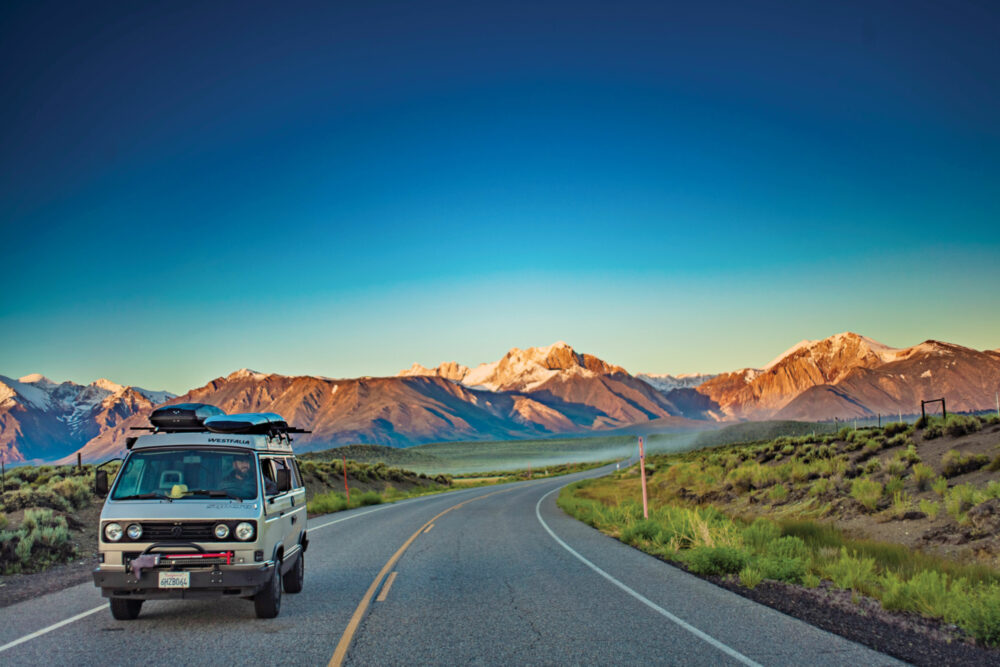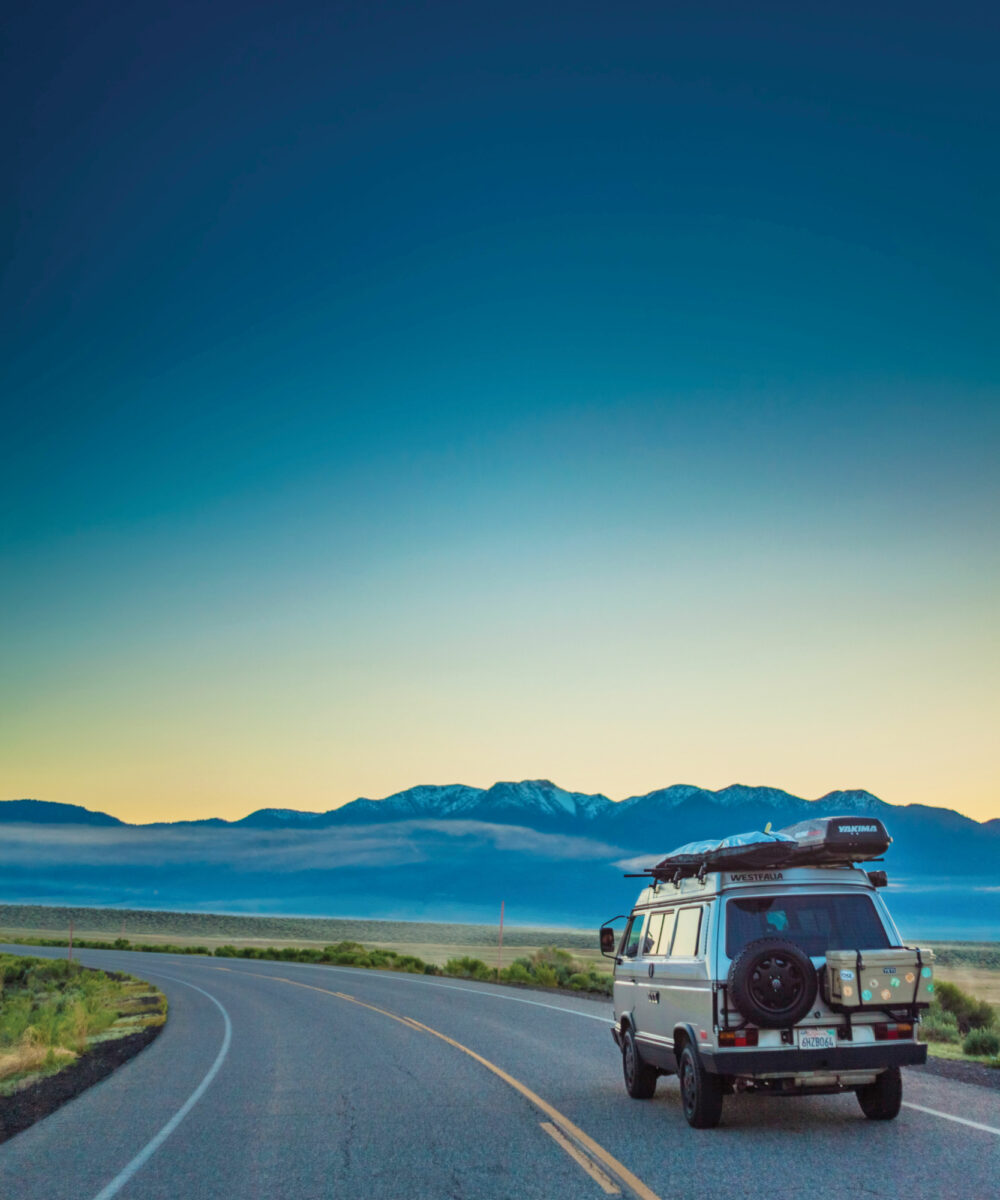
Departments
Travel

Finding God in Lost Places
We Stood Upon Stars: Finding God in Lost Places tells the story of a traveler finding God in the beauty of nature.
I’ve been terribly lost—slept in tents, tarps, surfboard bags, rental cars, cots, makeshift shelters, hammocks strung between tropical trees, narrow spaces between cacti, holes dug in the snow. I’ve also slumbered in luxury lodgings within national parks. When I need to hear God, I find Him in lost places—cathedrals of evergreens, skeletal desert, holy waters of the Pacific. There I hear His voice echoing upon the water, uncluttered from distractions of work, life and church. In those sacred spaces God gets my attention and speaks truth into my life. In lost places I feel most found.
When we’re hurt and uncertain, confused about what’s next, or when we’re so filled with joy that the space around us can no longer contain it, we take to trails and highways to search.
We search mountaintops and valleys, deserts and oceans. We hope sunrises and long views through canyons will help us discover who we are or who we still want to be. We also search our own inner landscapes and describe our emotional and spiritual state with topographical language. Love like an ocean. Grief like a desert. Peace like a river. The language of our hearts reflects the language of creation because in both are fingerprints of God.
Following are a few stories—behind-the-scenes snippets from a collection of adventures in my latest book, We Stood Upon Stars: Finding God in Lost Places. If you recognize yourself in these stories or they stir a longing to seek the horizon, listen to that Voice. It’s the one that called upon the waters and separated day from night. Then follow God into landscapes known and unknown. For like the work of an artist, landscapes reveal something of the One Who created them.
Joshua Tree National Park, California
Warm winds come like the breath of God to awaken the wildflowers. It’s the Super Bloom. The desert has lain dormant for a long season and the bloom lasts only a moment—long enough to show the full potential of the desert’s beauty. Super Blooms blossom from patience and utter dependence: Seeds lie in the deepest scars of earth, ensconced in their full potential, waiting for rain.
The desert is a critical landscape in my life. I go in spring, after a difficult winter, when I need to hear from God or be reminded He is there. Joshua Tree National Park is my favorite.
Joshua Tree is a rock-climbing paradise. People come from all corners of the world, working their fingers into cracks in the rock to ascend desert walls and touch the eternal. Travelers who don’t come for climbing come for the stars. We are wired to look up, to seek the dark sky and wonder what is out there and where it all came from and what our purpose is in it. And the clarity of the desert is the best place to look and to seek. Sometimes being lost in the desert is the closest we’ll be to finding our way. About 10 percent of the earth is covered by desert. Perhaps our lives should reflect the same.
Much of God’s revelation throughout scripture came to those who wandered the desert, traveling in search of promises or running from the One Who made promises. Whether cloud and fire or burning bush, God showed up. The desert can be a hard time for believers. We pray for relief and in silence feel ignored; sometimes, though, non-answers are the answer. Answers to a different question: Do we trust God enough to wait? A Super Bloom requires a precise amount of rain—too little and seeds won’t germinate, too much and seeds rot or wash away.
While we wait, the desert’s night sky is a promise that something bigger than darkness governs the light. The psalmist questions, “When I look at your heavens, the work of your fingers, the moon and the stars, which you have set in place, what is man that you are mindful of him?” Psalm 8:3–4 ESV. The Super Bloom in our lives will come. That’s been promised. When it comes, it will likely grow from our deepest scars.

Glacier National Park, Montana
I arrived at Glacier National Park with my family, wondering whether I had what it took to be a father. As I stood
on the shore of Lake McDonald, the scripture came to me: “I lift up my eyes to the mountains—where does my help come from?” Psalm 121:1 NIV.
Peaks towered in every direction, the highest summits distinguished by glaciers that from a distance look like long white beards. They appeared as a gathering of wise men who know of this age and the ages before. For they were there when God first spoke to creation and separated heaven from earth.
The task of being a father with sons is to teach them how to become Godly men. It’s hard to teach what we
struggle with ourselves, so I took my sons to the wilds, hoping for mountains and rivers to help. We found a short
river rapid cascading down three flights of boulders. I was nervous to let my boys kayak it alone. They were scared. They were also ready. I stood in the river below and watched my boys conquer their fears. In the process, they helped me conquer mine.
After the rapids, my boys searched the river’s shore. One searched for trout and the other for a toad. I searched for something that until then I believed was beyond reach. I looked to the mountains for wisdom in how to be a father and how to raise my sons in a world that increasingly believes fathers no longer matter. I looked to the Maker of mountains to stand in the gap of what I have to offer my boys and what I want for them.
His words were written in the wind and along the riffles and under the stones my boys turned in their search. I could see His handwriting all around me. It was a poem penned in wildflowers and the quaking of aspen leaves. The mountain peaks have continued to echo the voice of God since He first called them into place. Those echoes will tell my boys that they have what it takes to become men. Then the sound will bounce off my sons and tell me the same.
San Juan Islands, Washington
I wanted to take my wife somewhere special for her 40th birthday. We got married when she was … 24? ... 25? ... 22? ... hmmm; we’ve been married a while. She deserved Paris. We could afford Seattle. We walked to the Pike Street flower market and dined at sidewalk cafes under the changing color of broad-leafed maples and elms. The city felt fast, like our life at the time. So, we slipped north to find much quieter Orcas Island.
The island is shaped like a horseshoe, with its main village set in the innermost bend. We walked holding hands along vintage Main Street. The sun, hung low on its early winter arc, cast flattering light on shingled cottages snuggled deep in the bay of the East Sound. Life is busy, and love struggles at high speeds. I’ve learned we need to periodically reset the speed of our clock, because the best love is slow. Like an afternoon passed in the rear of Darvill’s Bookstore, sipping tea and coffee and thumbing through volumes of books we never take time to read.
December was coming and our cottage was fortified with stacks of split hardwood. We kept the fire warm and snuggled beneath woolen blankets on the porch of our cottage, watching autumn light change the color of the bay from deep emeralds of morning to afternoon blue. Great waters always seek their level. We stand at the turbulent shore of oceans and find tranquility in the horizon—this is why we came to the sea. We reminisced and dreamed. We gave thanks for the blessing of being married to the one we are meant for. I’ve traveled the world. My wife’s heart is my home.
The rest of the day was spent walking. Romantic love is a slow exploration of a lover’s heart. It’s the simple questions: “Why does this song move you?” Or “What do you like about chai tea or wild mushrooms or the mix of trees that edge the meadow?” In knowing what she loves about these things, I learn about secret islands untraveled by anyone but me. In a crowded and charted world, these are the only undiscovered places left.
Past the village our walk ends at a hand-hewn fence rising from wild grasses and overlooking a bay crowded with wooden boats anchored deeply enough to weather the coming storm. All is quiet except sounds of outgoing tide and poetry of sea birds. My wife wraps her arms around me to protect us from the cold. I’m safely anchored. Our love is deep November. Warm fires and slow walks ensure the safe passage of winter.

June Lake Loop, California
Chuck’s question made me mad. We were there to fish. As we turned off Highway 395, headed toward a favorite fishing hole just past Silver Lake, I changed the subject to which flies I would use in the thin water of late season flows. He went along with the conversation—the question had already
been asked.
Silver Lake lies at the base of all beauty. It’s the oldest fishing resort in the Eastern Sierras. From Lakeshore, sawtooth peaks soar in every direction, the crevices filled with snow and ribbons of aspens running gold in autumn. Horsetail Falls, fed by alpine lakes and headwaters deep in the Yosemite wilderness, feathers into the valley. Light falls softly, as fresh on skin as a misty waterfall. Water once again focuses at the lake’s downstream meadow, turning back into a creek.
We started fishing there. We explored a few watersheds and fished a few creeks and caught a few small fish—that were larger by end of day. There was campfire and dinner and whiskey. The question was asked again: How was I doing prioritizing my marriage over work? I didn’t like it any more than the first time asked. But a campfire is like truth serum and through fishing we’ve earned each other’s trust. Conversation faded, with constellations slipping behind granite peaks. We made promises to be better husbands and fathers and, by doing so, became better friends.
There are few places where guys feel comfortable talking about their struggles. Most guys I know won’t have these conversations at church or men’s retreats and certainly not in a small group with other couples. The better place is in the wild, where mountains put problems in perspective and lack of programs and walls gives us direct access to God. Men are made to hear God in places He created. We grow suspicious in places created by other men.
Chuck and I fish often. We’ve covered a lot of water in our search for trout. A good friend is someone who will travel the miles yet never forget the destination. Truth, like trust, is earned through time. There’s no other way, whatever the curriculum promises. Our fishing trips are now a check-in—we ask the hard questions and expect only the truth. Except for in the size of our fish.

Roger W. Thompson
Travel is as personal as what we search for. I offer these tips discovered along my journeys.
Allow Time to Explore
Make reservations at popular destinations while allowing plenty of free time for discovery. Chance upon rustic lodges, quaint B&Bs, remote campgrounds, trails to explore and other out-of-the-way places.
Follow Waterways
Travel along highways and back roads that parallel waterways to take in intriguing views and to come across campgrounds, picnic areas and fishing holes.
Ditch Devices
On long monotonous roadways, devices might be welcome distractions for traveling companions. Otherwise, devices detract from adventures. Certainly, pack devices and chargers, kept out of sight for most of the trip.
Involve Family in Travel Plans
Listen to hopes and dreams of family for activities that keep everyone engaged and active. A few hours of diversion might involve skateboarding, surfing, hiking, fishing, canoeing, kayaking, exploring museums or shopping.
Crop the Photos
Reserve snapping pics for special occasions. Take in scenery through fresh eyes—yours—rather than a camera lens.
Yield to Unplanned Stops
Follow an itinerary loosely, missing a scheduled destination when intriguing possibilities present themselves. Be adventurous, skip the time-table and be captivated by discoveries.
Greet the Locals
Stop by coffee shops, breweries, and cafes to soak up local culture while striking up conversations with town folks. Ask what to do in the area; chatting a few minutes typically reveals all you have in common.
Count on AAA
Real adventure often begins when misfortune intrudes, yet, sometimes results in the liveliest travel stories. Join AAA for assurance, however, then accept (or expect) misadventures and make the most of them.
About the Writer
Roger W. Thompson lives in Ventura, California, with his wife, two young sons, five productive chickens, and an Australian Shepherd. When not writing, Roger travels, surfs, snowboards, builds furniture and fly-fishes.
We Stood Upon Stars is a poetic, honest, and often hilarious collection of travel stories that will kindle adventure and spiritual reflection while inspiring deeper connections with family and friends.
Adapted from We Stood Upon Stars. Copyright © 2017 by Roger W. Thompson. Published by WaterBrook, an imprint of Penguin Random House LLC.
We want to keep in touch.
Don’t miss out on the latest Life:Beautiful updates, promotions and news.








